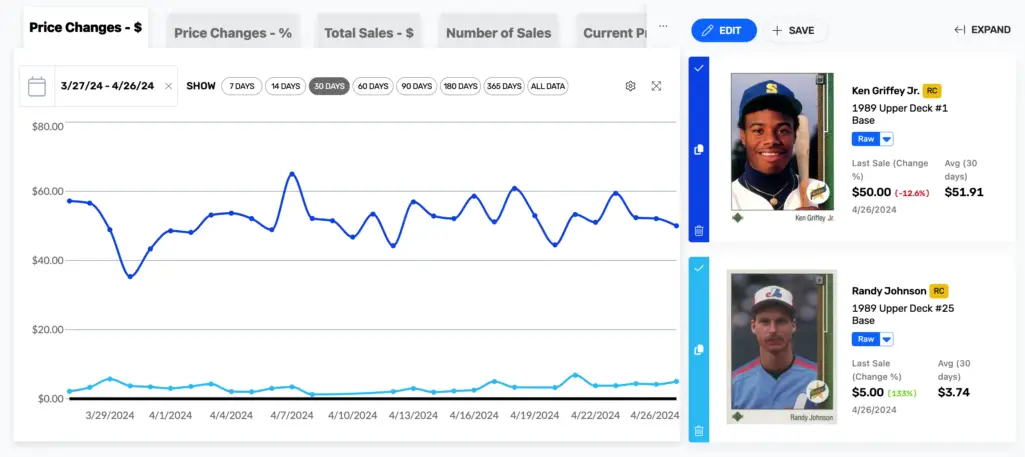 Ryan Barone (@ballcardgenius on TikTok, Card Expert) is a lifelong member of the hobby. He has been quoted in PSA Magazine, and his content has regularly been mentioned in “Quick Rips” (the Topps RIPPED Newsletter) and across other hobby publications. Join his 8,600 followers on TikTok! hello@ballcardgenius.com; Last Time Ago LLC dba Ballcard Genius.
Ryan Barone (@ballcardgenius on TikTok, Card Expert) is a lifelong member of the hobby. He has been quoted in PSA Magazine, and his content has regularly been mentioned in “Quick Rips” (the Topps RIPPED Newsletter) and across other hobby publications. Join his 8,600 followers on TikTok! hello@ballcardgenius.com; Last Time Ago LLC dba Ballcard Genius.
Affiliate Disclosure: This post contains affiliate links. As I am a part of the eBay Partner Network and other programs, if you follow these links and make a purchase, I’ll receive commission. As an Amazon Associate, I earn from qualifying purchases.
When I was a young baseball card collector, there was – of course -Topps, but there was also Upper Deck, Score, Donruss, and a host of other brands.
Today, the brands are still there, but they look a lot different than they did in the past…not to mention that there has been a major shakeup in terms of the different sports the brands specialize in.
So, today we are looking at one piece of that puzzle—Topps vs. Upper Deck.
Topps History
If you were a collector years ago and are just getting back into collecting today, Topps is a name you know, given they’ve been producing trading cards for over 70 years.
Mostly attached to the sport of baseball, you can find old Topps cards in football, basketball, and even hockey, and across pop culture with Star Wars, WWE, and other big-name brands.

Today, Topps is one of the most well-known and respected names in the trading card industry, and its products are collected by fans all over the world. As we will dive into in a few sections, Topps is known as a baseball card brand even though they produced licensed NFL cards up through 2015 and licensed NBA cards through 2009-10.
Upper Deck History
Upper Deck is still one of the biggest names in trading cards, but their journey has been much different than Topps’. Jumping into the game much later than Topps with their inaugural 1989 release, Upper Deck was actually born out of the idea that existing trading cards could be improved.
Gifting us with one of the most memorable and valuable Upper Deck cards – 1989 Ken Griffey Jr. #1 – the company known for gloss and holograms produced licensed baseball cards until 2009.

The most sought-after and valuable Ken Griffey Jr. card wasn’t Upper Deck’s only contribution to the card game during its flashy entrance—they are also credited with being the first company to insert auto cards into packs.
But in 2009, a landmark deal between the MLB and Topps granted Topps exclusive rights to produce MLB cards. For all of the other companies, Upper Deck included, cards could still be produced to feature a player’s image and likeness thanks to the Major League Player’s Association, but could not include team logos or names.
It’s for this same reason that today that Panini baseball cards like those from Donruss don’t have logos.
Baseball wasn’t Upper Deck’s only sport, though. They produced licensed NFL and NBA cards through the 2009 season.
Sports Cards by Brand
Given the history of both Topps and Upper Deck, there is a clear distinction between the different cards both companies produce in today’s hobby.
Topps
As mentioned and is crystal clear in one look at the Topps website or any online baseball card store, Topps specializes in producing baseball cards. And if you look at the Topps release calendar, you can see just how many cards the company produces each and every year.
Here are some examples:
- 2024 Topps Series 1 Variations
- 2024 Topps Series 1 Most Valuable Cards
- 2022 Topps Update Most Valuable Cards
With that said, there have been some recent forrays back into other sports. For example, with the NCAA and NIL now in play, Topps and others can create cards using the Name, Image, and Likeness of amatuer athletes long before they hit the professional ranks.
Topps took advantage of this, rolling out Bowman University Football cards and basketball cards (though, without college names and logos).
Upper Deck
For Upper Deck, while their licensed run of baseball, basketball, and football came to a screeching halt, the NHL and NHLPA contracts beginning back in 2009-10 still continue today.
One big difference to point out here between Upper Deck and Topps is Upper Deck’s e-pack platform, which allows collectors to buy and rip packs with a few button clicks. While the process is entirely virtual, many of the cards themselves are real, meaning they can be redeemed in exchange for their virtual counterparts.



